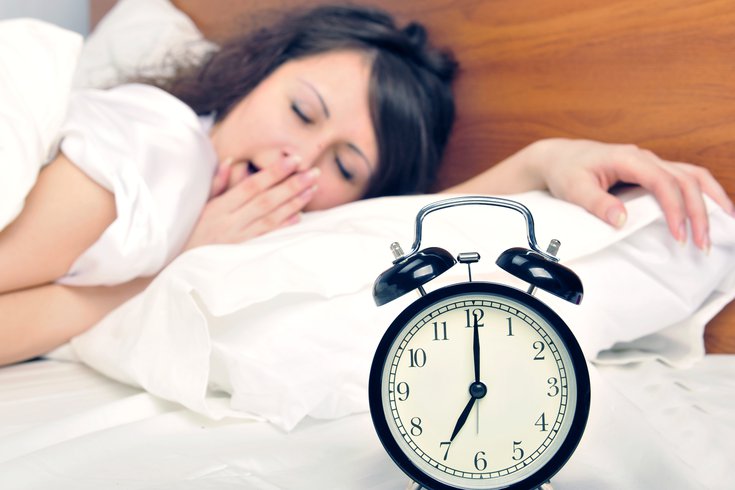
August 16, 2022
 Source/Image licensed from Ingram Image
Source/Image licensed from Ingram Image
Waking up can be a challenge for many people. That groggy feeling may stem from being in a state of sleep inertia – the transition from sleep to wakefulness.
Many people struggle to wake up in the morning without feeling groggy. Instead of jumping from the bed, ready to face the day, they drag their feet to their coffee pots for a jolt of caffeine.
They could be lingering in the state of sleep inertia – the transition from sleep to wakefulness.
Sleep inertia is a circadian process that regulates memory, mood, reaction time and alertness upon waking. When people are in a heightened state of sleep inertia, they may feel groggy and prefer to fall back asleep. They also may experience impaired thinking and decision-making.
Sleep inertia usually only lasts 15 minutes to a hour, but for some people it can last hours. Research has shown that this impairment can rival the effects of sleep loss. In one study, people performed worse on an addition test given immediately after they woke up than they did after a night of sleep deprivation.
This impairment in cognitive skills and reaction time can affect anyone's quality of life, but it particularly can be dangerous for people on shift work or on-call workers who have to drive, operate heavy machinery or save people's lives immediately upon waking.
Sleep inertia is not a sleep disorder, but some people who frequently have trouble waking up may also experience sleep drunkenness, also known as confusional arousal or excessive sleep inertia. It has nothing to do with alcohol consumption, but the disorientation is similar to that of a person coming back from a long night at the bar.
Sleep drunkenness is a type of parasomnia – a group of disorders that involve unwanted experiences that occur while falling asleep or waking up, or even during sleep. As many as 1 in 7 adults experience sleep drunkenness, according to a Stanford University study. People who experiences severe morning sleep inertia are at higher risk.
Scientists don't completely understand why waking up can be hard. Some research has shown there is a decreased blood flow velocity in the middle cerebral artery immediately after waking, which can last for up to 30 minutes. MRI studies have shown that connectivity within the sensory motor network is lower upon awakening than it is prior to sleep. Some data also suggests that high levels of adenosine, a naturally-occurring chemical that relaxes and dilates blood vessels in the body, may be a significant factor.
Other factors that are known to contribute to heightened sleep inertia include fatigue caused by a medical condition, a sedentary lifestyle, anxiety, depression, inconsistent sleep, dehydration, a poor sleep environment and sleep disorders. But data shows that even people with no underlying health issues may struggle with morning wakefulness.
Though a little grogginess in the morning is normal, it can affect a person's quality of life if it frequently lingers into the day.
Sleep experts say the best way to get to the root of the problem is to evaluate sleep quality and quantity. It is important to sleep for at least 7-9 hours a night, but those hours of sleep should be restful, too. Poor sleep quality, including waking up frequently during the night, has been linked to several health conditions including diabetes, obesity and hypertension.
People whose sleep inertia lasts longer than an hour, and those who experience excessive sleepiness throughout the day are advised to consult a doctor to rule out chronic conditions like diabetes and sleep disorders.
There are also some small adjustments people can make to feel more alert in the mornings. Here's what sleep experts recommend:
• Strategic napping. Daytime naps lasting no longer than 20 minutes can help people stay more alert, Healthline reports. Avoid long naps, which will make it harder to fall asleep at night.
• Light and temperature. Adjusting the temperature in the bedroom can help people sleep more comfortably, the Sleep Foundation says. Make sure all electronics and lights are turned off. Artificial light can disrupt the body's natural circadian rhythm.
• Gentle waking. The sound of an alarm clock in the morning can be jarring. Instead try using a smart clock, which can sense when a person is a in a light state of sleep, or a sunrise alarm clock, which slowly wakes people by increasing light and gentle sounds.
• Stay hydrated. Dehydration decreases alertness and increases sleepiness and fatigue. The Institute of Medicine recommends women consume 2.7 liters ,or 91 ounces, of fluids daily. Men should drink 3.7 liters, or 125 ounces.
• Practice a healthy lifestyle. Eating a healthier diet and exercising regularly promotes good physical and mental health, but it also improves sleep health.
• Caffeine. Yes, of course, that cup of coffee – or two or three – in the morning also can provide an added boost in the morning.